The Absolute Best Nuts to Eat for Your Body and Brain
Nuts may be small, but they provide us with big sources of nutrition like healthy fats, protein, and key vitamins and minerals.
Not all nuts are created equal, however, so here are the best nuts to eat regularly for your body, brain, and overall health, why they’re great, and how to enjoy them.
Walnuts for Your Heart and Brain
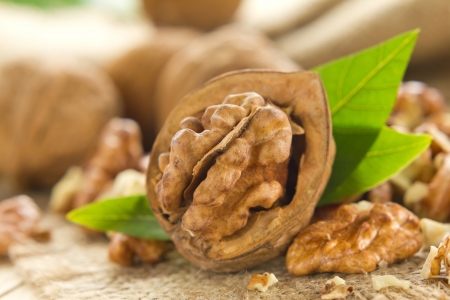
Walnuts are top of the list for best nuts to eat because of their omega-3 fatty acids, essential fats we must get from food.
There are two types of essential fatty acids:
- Omega-3s: alpha-linolenic acid (ALA) and docosahexaenoic acid (DHA)
- Omega-6s: linoleic acid (LA)
The average American eats between a 14:1 and 25:1 ratio of omega-6s to omega-3s, but a healthy diet should have a ratio between 2:1 and 4:1 omega-6 to omega-3, according to the University of Maryland Medical Center. Some experts recommend an even lower ratio.
Most people get plenty of omega-6 fatty acids from vegetable oils like soy, corn, safflower, and sunflower oils but not enough omega-3s. This is where walnuts are very helpful.
Walnuts Benefits
The great omega-3 source is one of the biggest benefits of walnuts.
According to WebMD, research has shown higher intake of omega-3s may be linked to lower levels of depression, lower triglycerides (blood fats that can increase the risk of heart disease), and support for memory loss related to aging mental skills.
There’s a reason walnuts have been called the “brain nut”!
How to Eat Walnuts
Walnuts are great stirred into our morning oatmeal or crumbled on cereal, thrown on top of salads, or stirred into homemade trail mix or fruit salad.
You can even bake them into healthy muffins, banana bread, or in breakfast cookies for a boost of healthy essential fats.
Almonds for Fiber and Good Fats
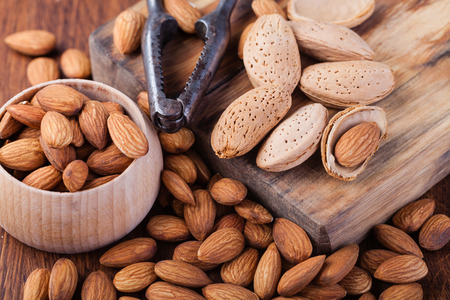
Almonds can be traced back to Biblical times, mentioned in the Book of Numbers, have been recognized as healthy for centuries. They’re a fairly versatile nut with many benefits.
Benefits of Almonds
Per ounce, almonds are the tree nut highest in fiber, protein, calcium, vitamin E, niacin, and riboflavin. They’re also great sources of magnesium, manganese, copper, and phosphorus and have 13 grams of unsaturated fats (“good” fats) with only one gram of saturated fat.
Research has shown almonds may support the heart, blood sugar, and weight management, according to the Almond Board of California.
Almonds are also, like all raw nuts, are a great gluten free snack.
How to Eat Almonds
Have a handful of almonds as a snack. You can also buy or make your own almond butter for spreading on fruit, veggies, toast, or stirring into oatmeal. See this recipe for no-sugar-added almond butter brownies!
Peanuts for Affordable Nutrition
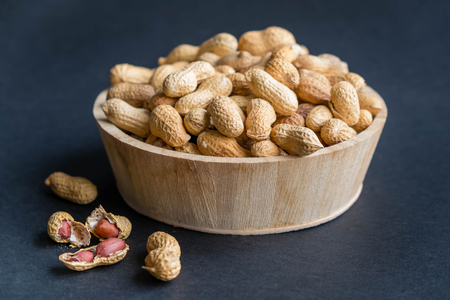
Peanuts are technically not nuts at all (they’re in the same “family” as lentils, beans, and soy nuts), but they make the list because their nutrition is very similar—plus, they’re often much more affordable than other nut options!
Peanuts used to get a bad rap for their high fat content, but we now know that some fats are good and they have some great benefits.
Benefits of Peanuts
Peanuts are an excellent source of protein, especially for vegetarians and vegans, with eight grams of protein in two tablespoons of peanut butter.
They’re also rich in several vitamins and minerals including copper, manganese, magnesium, vitamin E, folate, thiamin, phosphorus,and biotin, and are high in fiber, low in carbs, and low on the glycemic index.
For those on a budget or looking for a plant-based source of fats and protein, peanuts are a cost-friendly choice.
How to Eat Peanuts
A handful of peanuts or spoonful of peanut butter is a good snack option. Peanuts are also great for homemade trail mix, homemade granola bars, or on top of oatmeal.
Buy or make peanut butter to spread on toast, vegetables, fruit, or to stir into yogurt, oatmeal, or salad dressings, or sauces for stir fries or other dishes.
Pecans for Antioxidants and Low Carb
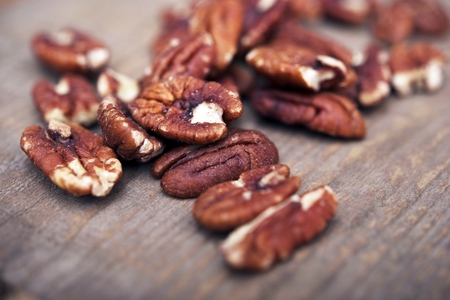
Most people think of pecans are a dessert nut, used in pecan pies and other decadent holiday treats. But without all the sugar and richness, pecans provide a distinct, buttery flavor and great health benefits by themselves.
Benefits of Pecans
Pecans have higher levels of gamma-tocopherols, a form of vitamin E and another antioxidant, than other nuts. They’re also rich in zinc, thiamin, copper, and manganese.
For those cutting down on carbs, pecans are one of the best nuts to eat on a low carb diet. They’re made of 70% fat (the good kind!) with only 1.2 net carbs per ounce.
How to Eat Pecans
You can roast them in the oven, stir them into oatmeal or cereal, add them to unsweetened yogurt, toss them on salads, mix them into homemade trail mix, or add them to buckwheat pancakes.
Pecans are great added to comfy fall dishes like baked acorn squash or banana or pumpkin bread or muffins.
Brazil Nuts for Selenium
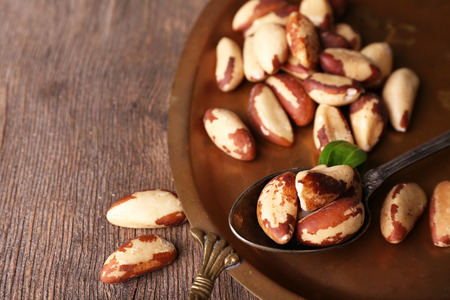
Brazil nuts come from a tree in South America with a unique nutrition profile that makes them a very healthy nut.
Benefits of Brazil Nuts
Brazil nuts stand out from other nuts for their fantastic source of selenium, which is crucial for optimal health and can be hard to get in your daily diet if you don’t eat many animal foods or grain. Just one serving of Brazil nuts goes above your daily requirement!
According to NutritionFacts.org, one study showed a single serving of Brazil nuts immediately improved cholesterol levels.
Like pecans, Brazil nuts are also low in carbs (with 1.4 net carbs per ounce) and one of the highest fat contents.
How to Eat Brazil Nuts
You do not need very many Brazil nuts to reap their benefits. According to the American Journal of Clinical Nutrition, up to two Brazil nuts per day is plenty to raise selenium levels—and in fact, too much can be harmful!
For a boost of healthy fats, protein, and vitamins and minerals, aim at least an ounce per day (about a small handful) of nuts. Get creative, try out different types, and find the ways you enjoy them most!
Disclaimer: Statements made have not been evaluated by the FDA. Products are not intended to diagnose, treat, cure, or prevent any disease.
Recent Posts
-
Potassium Bromate: The Health Risks of This Sneaky Additive and How to Avoid It
Are you consuming a common bread additive that’s a possible human carcinogen?That additive is known …Dec 1st 2023 -
6 Huge Benefits of Meditation for Your Mind & Body
You’ve probably heard something about the benefits of meditation for your brain, body, stress levels …Nov 30th 2023 -
5 Natural Damaged Hair Treatments and Remedies for Healthy, Vibrant Hair Today
If your hair’s been exposed to products, appliances, dyes, or even toxic environment factors over th …Nov 30th 2023




